In today’s digital age, building trust with your audience is crucial for any business’s success. With the rise of Digital Marketing, the way consumers interact with brands has changed dramatically.

Your Online Reputation plays a significant role in shaping consumer perceptions and influencing their purchasing decisions. A well-managed online presence can become a powerful marketing channel, driving customer loyalty and advocacy.
Table of Contents
How much do reviews influence buying decisions?
Reviews have a huge influence on buying decisions. Research shows that:
- Majority of consumers rely on reviews: Around 88% of people trust online reviews as much as personal recommendations. This means that reviews can make or break a purchase.
- Average star rating matters: Products with higher ratings (4–5 stars) are significantly more likely to be purchased than those with lower ratings.
- Quantity of reviews counts: A product with dozens or hundreds of reviews appears more trustworthy than one with just a few, even if the average rating is similar.
- Impact on first impressions: Many buyers read 3–5 reviews before forming an opinion, so early reviews can heavily shape perception.
- Negative reviews influence decisions: Even a small number of negative reviews can deter buyers, but balanced feedback can increase credibility.
In short, reviews are one of the strongest factors influencing purchase decisions, often tipping the scale between choosing one brand over another.
Why is reputation management a top priority?
Reputation management is a top priority because, in today’s digital world, a business’s reputation directly affects its credibility, customer trust, and ultimately its revenue. Consumers increasingly rely on online reviews, social media feedback, and brand perception before making purchasing decisions. A positive reputation attracts new clients, retains existing ones, and can differentiate a business from competitors, while a negative reputation can quickly damage trust, reduce sales, and create long-term challenges.
In short, reputation management isn’t just about image—it’s about sustaining growth, maintaining customer loyalty, and ensuring the business thrives in a competitive market.
If you want, I can also give a more detailed, business-focused explanation showing why
Have You Truly Harnessed the Power of Your Online Reputation?

In today’s digital age, your brand is no longer defined solely by your products or services—it’s defined by how the world perceives you online. With consumers increasingly relying on reviews, social media interactions, and search results to make purchasing decisions, your online reputation has become your strongest marketing channel. Every testimonial, every social post, and every mention of your business online contributes to a digital footprint that can either build trust and loyalty or deter potential customers. Studies show that 85% of consumers trust online reviews as much as personal recommendations, and a single negative review can cost a business up to 22% of prospective clients.
How does SpinGage simplify reputation building?
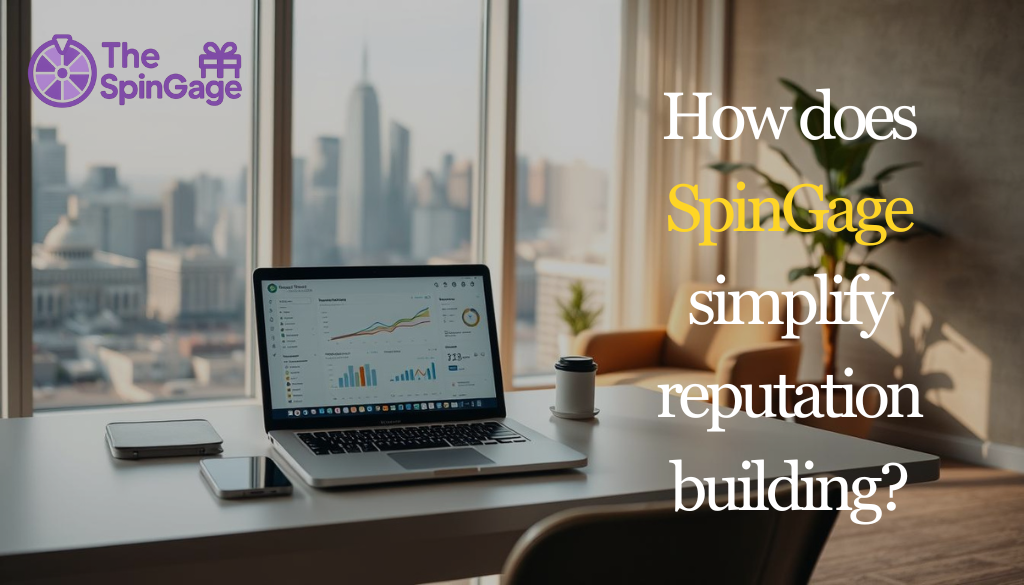
SpinGage simplifies reputation building by providing businesses with a centralized platform to monitor, manage, and enhance their online presence. Instead of manually tracking reviews, social mentions, and feedback across multiple channels, SpinGage consolidates all this information in one place, making it easier to respond promptly, address negative feedback, and highlight positive experiences. Additionally, it offers tools to encourage customer reviews, analyze sentiment trends, and generate actionable insights, helping businesses build trust and credibility more efficiently. Essentially, it turns a complex, time-consuming process into a streamlined, automated system that strengthens a company’s online reputation.
How does SpinGage automate review collection?
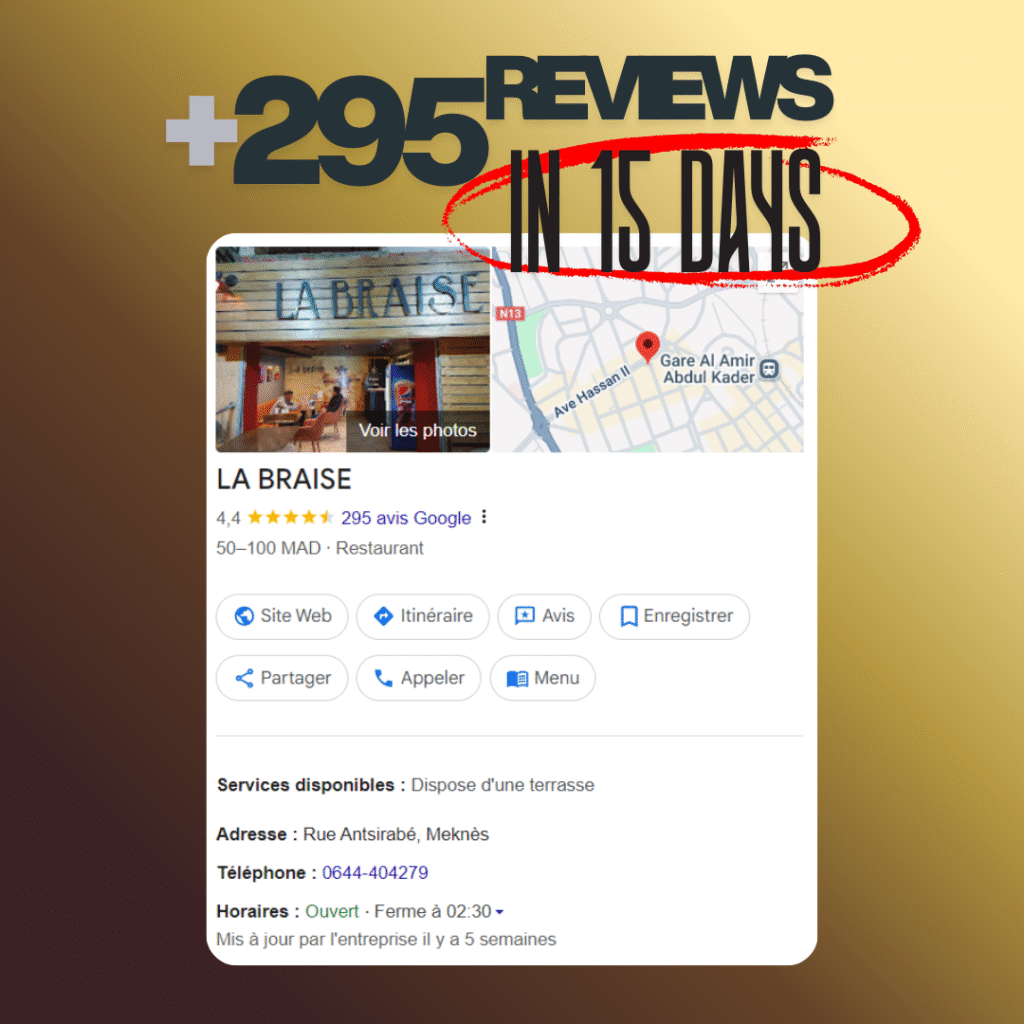
+295 REVIEWS IN JUST 15 DAYS :
Labraise is a restaurant that gained more than 295 new customer reviews and increased their income by using TheSpinGage solution.
They placed a flyer with a QR code on every table, allowing each diner to scan and spin the wheel. Labraise used a 100% winning ratio plan, where customers always won either 10% off their meal or a free soda.
This simple gamification encouraged guests to leave reviews, boosted loyalty, and kept customers coming back.

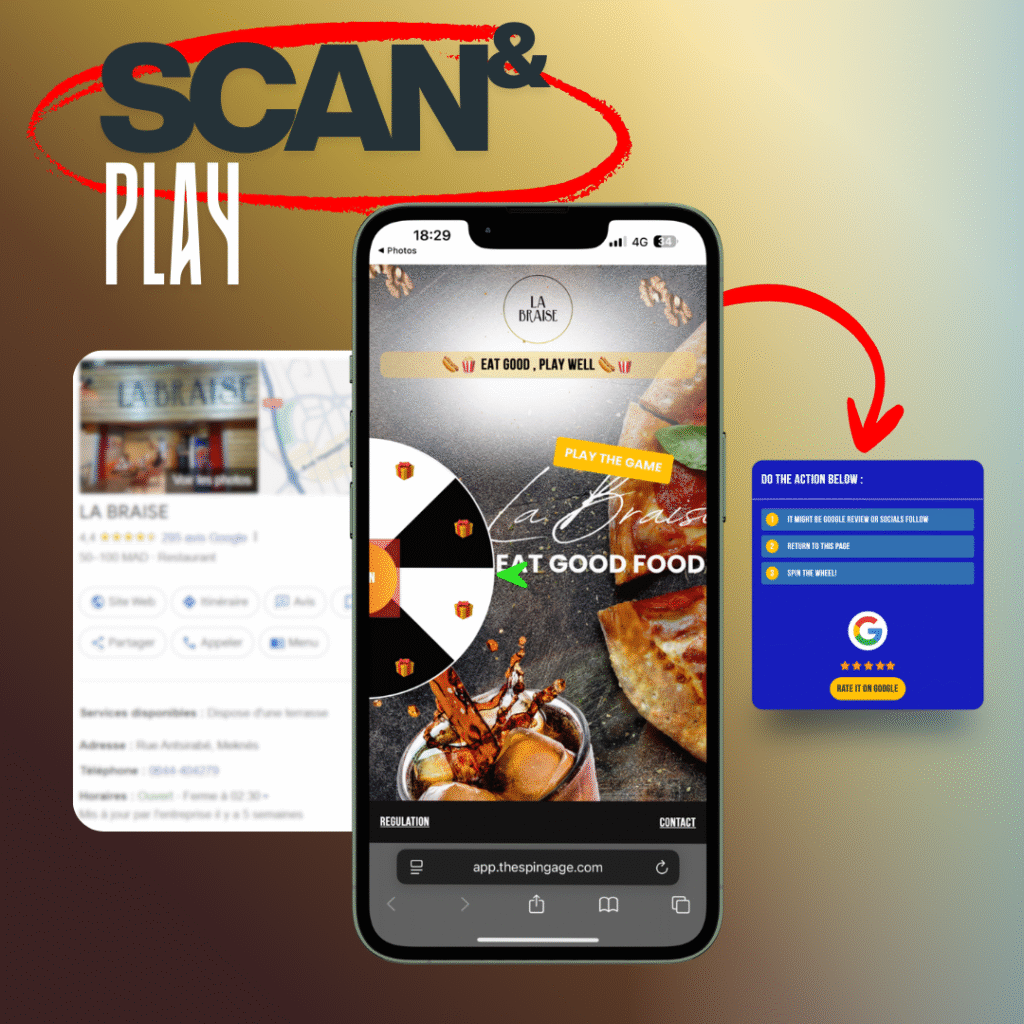
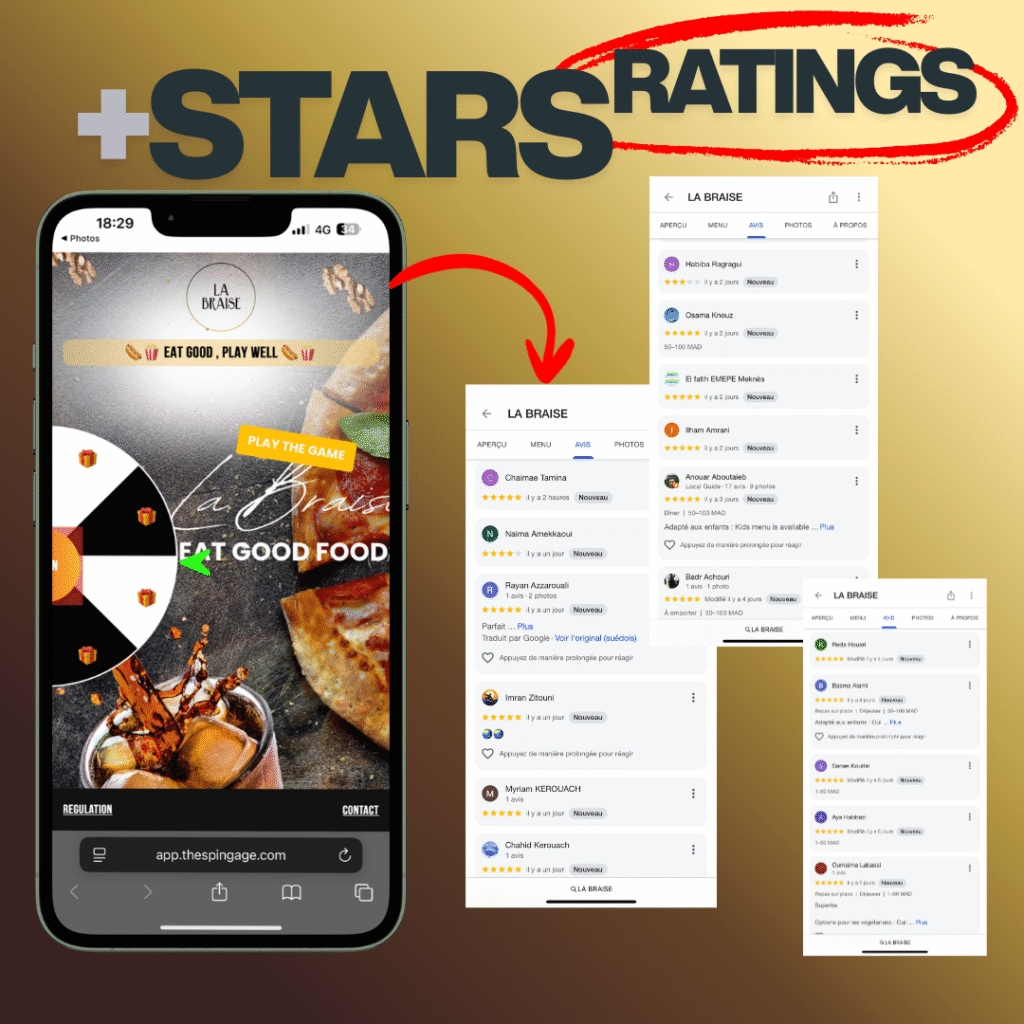
HOW IT WORKS IN 4 EASY STEPS ?
1 – Scan the QR Code
Clients simply scan the QR code placed on the table or provided directly by you.
2- Take Action First
To unlock the gameplay, they must complete the required action.
3- Spin the Wheel
Once unlocked, they spin the wheel to test their luck.
4- Win Rewards
If they win, a QR code is instantly sent to their email. If not, nothing happens. In both cases, the game is locked for 24 hours, ensuring fairness and excitement for the next try.
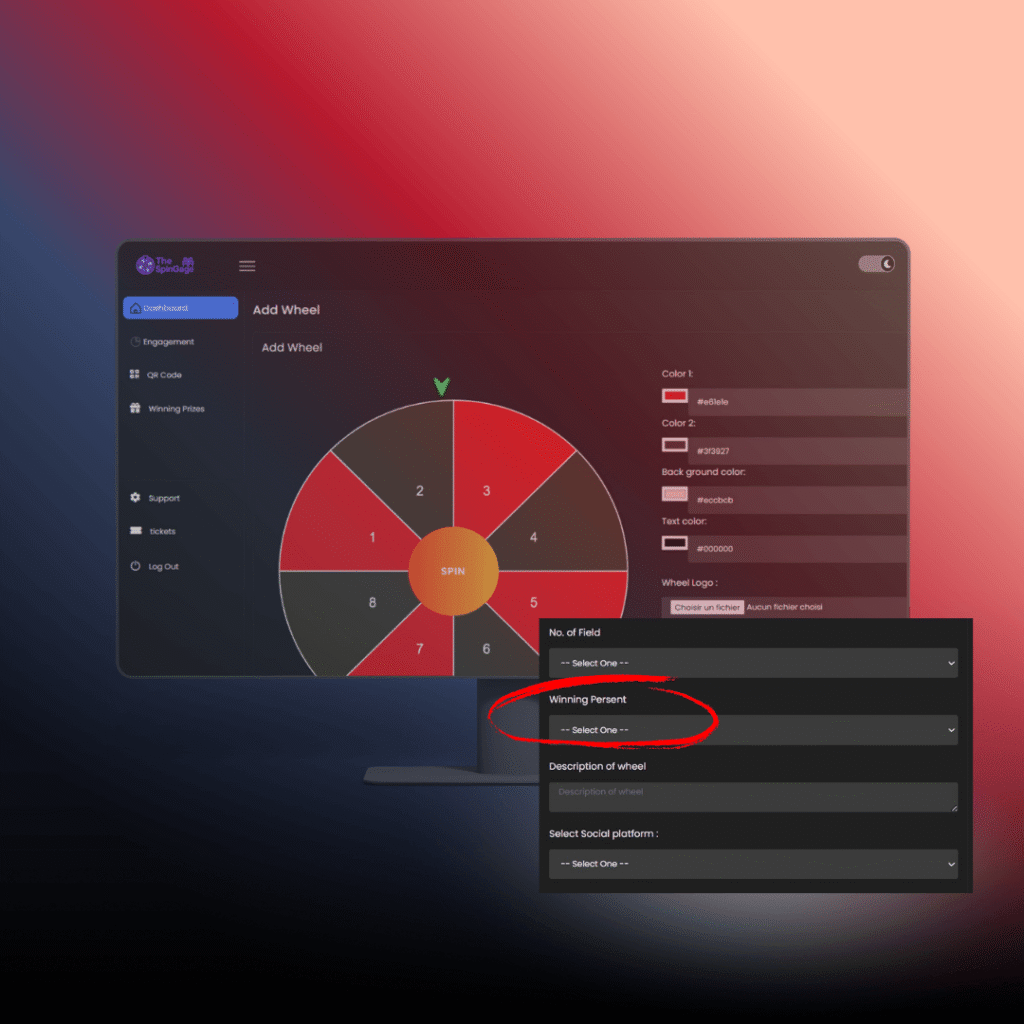


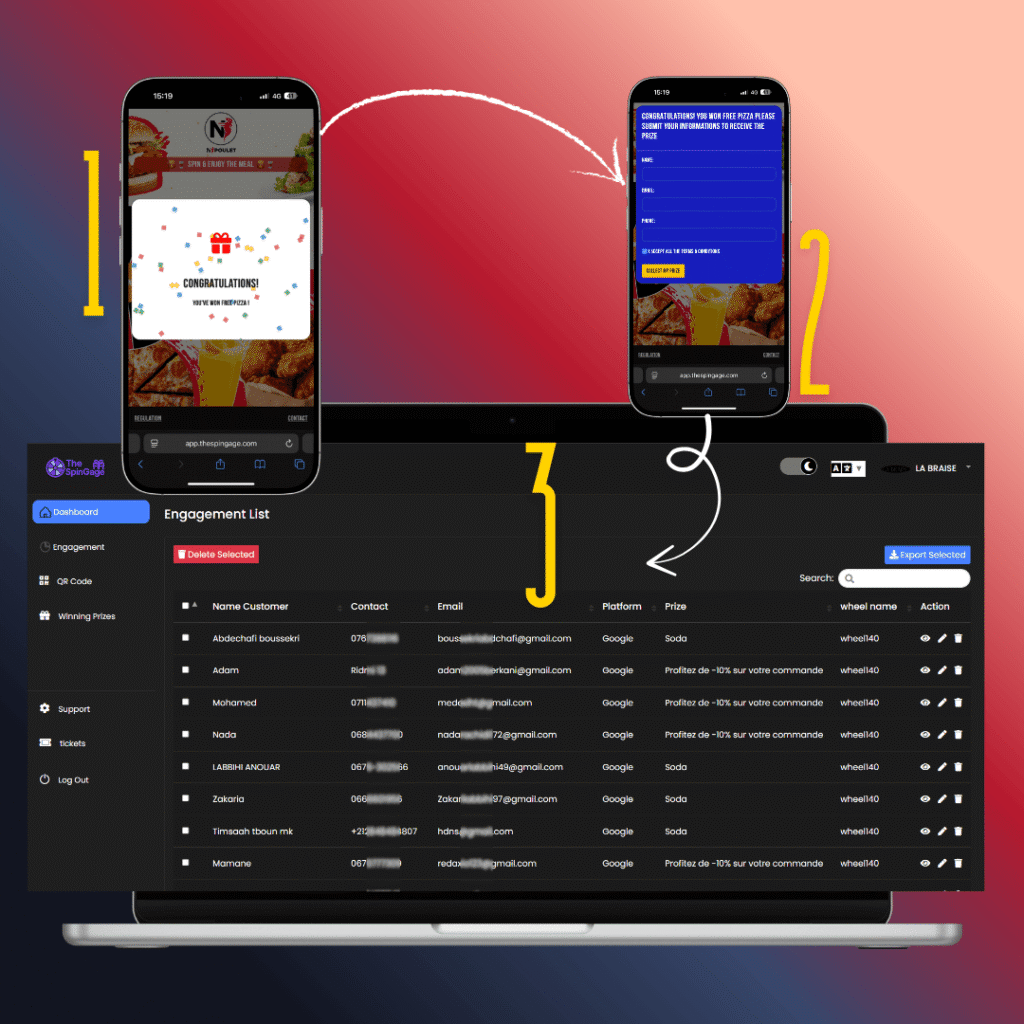
🛠️ Flexible Tracking Options
Track platform Top performing .
Track the wheel segments (number of prizes, Winner Gameplay).
Number of Plays , Track top performing wheel
Set up expiration dates for vouchers and offers.
Get Acces to LEADS , Extraxt & Modiify it .
Why You Should Opt for TheSpinGage Solution
Running a business today is not just about serving customers – it’s about creating memorable experiences that keep them coming back and spreading the word. That’s exactly what TheSpinGage delivers.
🎯 Stand Out from Your Competitors
Most restaurants, cafés, and shops rely only on discounts or word of mouth. With TheSpinGage, you turn every visit into a fun, interactive moment that clients remember and talk about.
⭐ Collect More Positive Reviews
Google reviews are the new “digital reputation.” Our system motivates clients to leave reviews in exchange for a chance to win rewards – giving you the social proof that attracts new clients effortlessly.
💌 Grow Your Customer Database
Every spin is an opportunity to collect emails and data, helping you stay connected with your clients through newsletters, promotions, and loyalty campaigns.
🔄 Boost Loyalty and Repeat Visits
Customers love rewards. By making every visit a chance to win, you encourage repeat visits, turning occasional clients into loyal fans of your business.
⚡ 100% Simple & Automated
No technical headaches. Once installed, TheSpinGage works automatically – whether through QR codes on tables, flyers, or digital screens. You just set the rules, and the system does the rest.
👉 TheSpinGage isn’t just a tool – it’s your new customer magnet.
Increase engagement, grow your reviews, and build a strong database without spending more on ads.
📲 Activate TheSpinGage today and turn visitors into loyal, returning customers!
START TODAY


SpinGage automates review collection by seamlessly integrating with your business platforms to prompt customers for feedback at the right moment. It can automatically send personalized review requests via email or SMS after a purchase or service, making it easy for customers to share their experiences. This automation not only increases the volume of reviews but also ensures consistent and timely feedback, helping businesses maintain a strong online reputation without manual effort.
Combine this with strategic local SEO practices, including keyword research, category optimization, and building citations and backlinks, and you’re positioning your business to dominate local search
By strategically managing your online reputation, you not only enhance your brand credibility but also reduce customer acquisition costs, foster long-term loyalty, and turn satisfied customers into powerful advocates. From engaging with your audience on social media to leveraging positive reviews and authoritative content, the opportunities to strengthen your digital presence are immense—and the results can be transformative. Are you ready to take control of your digital perception, elevate consumer trust, and drive sustainable growth through
Don’t leave your brand’s success to chance—start building a reputation that works as hard as you do.
Boost Your Online Reputation Now →
The Shift from Outbound to Reputation-Based Marketing
The traditional outbound marketing model, which relied heavily on interruptive advertising, is giving way to a more nuanced approach centered on digital trust. By prioritizing reputation-based marketing, businesses can create a more sustainable and effective marketing strategy that resonates with today’s discerning consumers.
This shift is driven by the growing importance of online reviews, social proof, and community engagement in influencing consumer purchasing decisions.
What Is Online Reputation and Why It Matters
In today’s digital landscape, your online reputation is the cornerstone of your business’s success. It encompasses how consumers perceive your brand across various online platforms, including social media, review sites, and search engines.
Defining Your Digital Footprint
Your digital footprint refers to the collective online presence of your brand, including your website, social media profiles, customer reviews, and mentions in online publications. Managing this footprint effectively is crucial for maintaining a positive online reputation.
The Business Impact of Perception
The way consumers perceive your brand online directly affects your business’s bottom line. A positive online reputation can lead to increased trust, customer loyalty, and ultimately, revenue growth. Conversely, a negative online reputation can deter potential customers and harm your business.
Statistics That Prove Reputation’s Value
Research shows that 85% of consumers trust online reviews as much as personal recommendations. Moreover, a single negative review can cost a business up to 22% of potential customers. The following table highlights the impact of online reputation on consumer trust:
| Reputation Aspect | Positive Impact | Negative Impact |
|---|---|---|
| Online Reviews | 85% trust online reviews | 1 negative review = 22% lost customers |
| Social Media Presence | Engaged community = increased loyalty | Negative posts = decreased trust |
As illustrated, a well-managed online reputation is vital for business success. By understanding and improving your digital footprint, you can enhance consumer trust and drive business growth.
The Psychology Behind Digital Trust and Purchase Decisions
The psychology behind digital trust reveals that it’s a complex interplay of various factors that influence a consumer’s decision to buy. Understanding these factors is crucial for businesses aiming to build strong online reputations.
How Consumers Make Trust-Based Decisions
Consumers make trust-based decisions by evaluating the credibility and reliability of a brand. This evaluation is often based on the brand’s online presence, customer reviews, and social media engagement. Positive reviews and high ratings significantly enhance a brand’s credibility, making it more trustworthy in the eyes of potential customers.
Social Proof as a Decision Driver
Social proof is a powerful driver of purchase decisions. When consumers see that others have had positive experiences with a brand, they’re more likely to trust that brand. This is why customer testimonials and user-generated content are so effective in building digital trust.

The Emotional Components of Brand Trust
The emotional components of brand trust involve creating a connection with the consumer that goes beyond mere transactions. Brands that successfully engage with their customers on an emotional level build loyalty and foster long-term relationships. This emotional bond is a key component of brand trust.
Online Reputation: Your Most Cost-Effective Marketing Channel
In today’s digital landscape, online reputation has emerged as a crucial marketing channel that offers unparalleled cost-effectiveness. As businesses continue to navigate the complexities of digital marketing, maintaining a strong online reputation stands out as a highly effective strategy for attracting and retaining customers.

Comparing ROI: Reputation vs. Traditional Marketing
When comparing the return on investment (ROI) of online reputation marketing to traditional marketing methods, the former often comes out on top. Traditional marketing channels like television, radio, and print advertising can be costly and often yield limited returns. In contrast, cultivating a positive online reputation through customer reviews, social media engagement, and quality content can generate significant returns at a fraction of the cost.
Studies have shown that consumers are more likely to trust recommendations from peers and online reviews than traditional advertisements. This shift in consumer behavior underscores the potential of online reputation as a cost-effective marketing channel.
The Compounding Value of Positive Reputation
A positive online reputation has a compounding effect on a business’s marketing efforts. As more customers leave positive reviews and share their experiences, the business becomes more visible and attractive to potential customers. This, in turn, can lead to increased customer acquisition and retention rates, further amplifying the initial investment in reputation management.
The compounding value of a positive online reputation also extends to its durability. Unlike traditional marketing campaigns that have a limited lifespan, a strong online reputation can continue to benefit a business over time, providing a long-term ROI that far exceeds that of most traditional marketing strategies.
How Reputation Reduces Customer Acquisition Costs
One of the most significant advantages of a strong online reputation is its ability to reduce customer acquisition costs. When potential customers see a business with a positive online reputation, they are more likely to trust the business and make a purchase. This can significantly reduce the costs associated with acquiring new customers, as the business relies less on expensive advertising and more on organic referrals and word-of-mouth.
By leveraging a positive online reputation, businesses can create a self-reinforcing cycle where satisfied customers help attract new customers, thereby reducing the overall cost of customer acquisition.
The Core Components of a Powerful Online Reputation
As consumers increasingly turn to the internet to inform their purchasing decisions, online reputation has become a vital component of business strategy. A robust online reputation is multifaceted, comprising several key elements that work together to build trust and credibility with potential customers.
Customer Reviews and Testimonials
Customer reviews and testimonials are crucial in shaping public perception of a brand. Positive reviews not only enhance credibility but also influence purchasing decisions. Businesses should actively encourage satisfied customers to share their experiences.
Social Media Presence and Community
A strong social media presence helps businesses engage with their audience and build a community around their brand. Regular updates, responsive customer service, and meaningful interactions foster a positive online image.
Content Authority and Thought Leadership
Establishing a brand as a thought leader in its industry involves creating high-quality, informative content that addresses the needs and concerns of its audience. This can include blog posts, whitepapers, and speaking engagements.
Search Engine Visibility and Brand Mentions
Maintaining visibility in search engine results and monitoring brand mentions across the web are essential for managing online reputation. This involves optimizing content for search engines and being aware of how the brand is discussed online.
The interplay between these components is crucial. For instance, positive customer reviews can enhance search engine visibility, while a strong social media presence can drive engagement with the content created by the brand.
| Component | Importance | Action Items |
|---|---|---|
| Customer Reviews | High | Encourage reviews, Respond to feedback |
| Social Media Presence | High | Regular updates, Engage with audience |
| Content Authority | Medium | Create quality content, Showcase expertise |
| Search Engine Visibility | High | SEO optimization, Monitor brand mentions |

Strategic Approaches to Building Your Online Reputation
Strategic online reputation building is no longer a luxury, but a necessity for businesses. In today’s digital landscape, a well-managed online reputation can significantly influence customer trust and loyalty.
Creating a Reputation Management Plan
A comprehensive reputation management plan is the foundation of a strong online presence. This involves setting clear objectives and identifying the channels that impact your reputation.
Setting Measurable Reputation Goals
To effectively manage your online reputation, it’s crucial to set measurable goals. These could include improving customer satisfaction ratings or increasing positive reviews.
Identifying Key Reputation Channels
Understanding the channels that affect your reputation is vital. This includes review sites, social media, and industry forums.
| Channel | Importance | Action Plan |
|---|---|---|
| Review Sites | High | Encourage positive reviews |
| Social Media | Medium | Monitor and engage with customers |
| Industry Forums | Low | Participate in discussions |
Proactive Review Generation Tactics
Generating reviews is a critical aspect of online reputation management. Businesses can encourage customers to leave reviews by providing excellent service and making the review process easy.
Content Strategies That Enhance Credibility
High-quality, relevant content can significantly enhance a company’s credibility. This includes blog posts, whitepapers, and case studies that demonstrate expertise and thought leadership.
By implementing these strategic approaches, businesses can build a strong online reputation that drives customer trust and loyalty.
Turning Negative Feedback Into Reputation Gold
Negative feedback, when handled correctly, can become a valuable asset in enhancing your online reputation. It’s about transforming criticism into an opportunity for growth and demonstrating your brand’s commitment to customer satisfaction.
The Right Way to Respond to Criticism
Responding to criticism requires a thoughtful and multi-step approach. First, acknowledge the customer’s concern promptly and sincerely. Then, offer a solution or compromise that addresses their issue. This proactive approach to Reputation Management not only resolves the customer’s problem but also shows potential customers your brand’s dedication to service.
Crisis Management Protocols for Reputation Defense
Effective Crisis Management involves having protocols in place to handle negative feedback on a larger scale. This includes monitoring social media and review sites closely, having a response team ready to address issues, and maintaining transparency in your communications. By being prepared, you can defend your reputation against potential crises.
Case Examples of Successful Reputation Recovery
Several brands have successfully turned negative feedback into reputation gold through effective Reputation Recovery strategies. For instance, a company might use a public complaint as an opportunity to showcase their customer service by resolving the issue publicly. These stories not only recover the brand’s reputation but also build trust with potential customers.
By embracing negative feedback as a chance to improve and demonstrate your brand’s values, you can enhance your online reputation and attract more customers.
Essential Tools for Managing Your Online Reputation
Effective online reputation management requires the right set of tools. In today’s digital landscape, businesses need to be proactive in monitoring and managing their online presence.
Reputation Monitoring Platforms
Reputation monitoring platforms are crucial for tracking brand mentions across the web. Tools like Brand24 and Mention help businesses stay on top of their online reputation by alerting them to new mentions and reviews.
Review Management Systems
Review management systems simplify the process of collecting and managing customer reviews. Platforms such as Trustpilot and Yotpo enable businesses to gather feedback and showcase positive reviews, enhancing their online reputation.
Social Listening and Analytics Tools
Social listening tools help businesses understand their audience and track brand conversations on social media. Tools like Hootsuite and Sprout Social provide valuable insights into customer sentiment and preferences.
SEO Tools for Reputation Management
SEO tools play a vital role in managing online reputation by optimizing search engine results. Tools such as Ahrefs and SEMrush help businesses monitor their search engine rankings and suppress negative content.
| Tool Category | Examples | Benefits |
|---|---|---|
| Reputation Monitoring | Brand24, Mention | Tracks brand mentions, alerts to new reviews |
| Review Management | Trustpilot, Yotpo | Simplifies review collection, showcases positive feedback |
| Social Listening | Hootsuite, Sprout Social | Provides insights into customer sentiment, tracks brand conversations |
| SEO Tools | Ahrefs, SEMrush | Optimizes search engine rankings, suppresses negative content |
By leveraging these essential tools, businesses can effectively manage their online reputation and maintain a positive digital presence.
“The key to successful online reputation management is being proactive and responsive. By using the right tools, businesses can stay ahead of the curve and protect their reputation.”
Measuring the Business Impact of Online Reputation
Quantifying the business impact of online reputation helps in making informed marketing and customer service decisions. To effectively measure this impact, businesses must adopt a multi-faceted approach that includes tracking key performance indicators, analyzing revenue connections, and benchmarking against competitors.
Key Performance Indicators for Reputation
To gauge the health of your online reputation, focus on KPIs such as:
- Customer satisfaction scores
- Net Promoter Score (NPS)
- Review volume and ratings
- Social media engagement metrics
Connecting Reputation Metrics to Revenue
It’s crucial to link reputation metrics to financial outcomes. This can be achieved by:
- Analyzing the correlation between positive reviews and increased sales
- Assessing how reputation influences customer retention rates
- Using data to demonstrate how improved reputation leads to revenue growth
Competitive Reputation Benchmarking
Benchmarking your online reputation against industry competitors provides valuable insights into your market standing. Utilize tools that track competitor reputation metrics to identify areas for improvement and opportunities to gain a competitive edge.
By focusing on these aspects, businesses can gain a comprehensive understanding of their online reputation’s business impact and make data-driven decisions to enhance their market position.
Success Stories: Brands Transformed by Online Reputation
Brands that have harnessed the potential of their online reputation have witnessed remarkable transformations. By focusing on building and maintaining a positive digital footprint, these businesses have not only enhanced their credibility but also driven significant growth.
Small Business Reputation Victories
For small businesses, a strong online reputation can be a game-changer. For instance, a local restaurant in California improved its online presence by actively managing customer reviews and engaging with its community on social media. As a result, it saw a 40% increase in customer footfall within six months.
Enterprise-Level Reputation Transformations
Large enterprises have also benefited from prioritizing their online reputation. A leading tech firm revamped its content strategy to showcase thought leadership, resulting in a 25% boost in brand mentions across major industry publications within a year.
Industry-Specific Reputation Strategies That Worked
Different industries have adopted unique strategies to enhance their online reputation. For example, healthcare providers have focused on patient testimonials and educational content, while e-commerce brands have leveraged user-generated content and influencer partnerships.
| Industry | Reputation Strategy | Outcome |
|---|---|---|
| Healthcare | Patient testimonials and educational content | 25% increase in patient inquiries |
| E-commerce | User-generated content and influencer partnerships | 30% rise in sales |
| Technology | Thought leadership content and industry reports | 20% increase in brand authority |
These success stories underscore the importance of a well-managed online reputation in driving business success. By adopting industry-specific strategies and leveraging digital tools, businesses can achieve remarkable transformations.
Integrating Reputation Management Across Your Business
To truly leverage the power of online reputation, businesses must integrate it into every facet of their operations. This integration is not just about having a strategy; it’s about creating a culture that values and prioritizes reputation management.
Training Teams to Be Reputation Ambassadors
Every team member, from customer service representatives to sales teams, plays a crucial role in shaping the company’s reputation. Training programs should be implemented to ensure that all employees understand the importance of their interactions with customers and how these interactions impact the company’s online reputation.
Aligning Departments Around Reputation Goals
Reputation management is not just a marketing function; it requires alignment across departments. By setting reputation-centric goals, businesses can ensure that every department is working towards enhancing the company’s online reputation.
Creating a Culture of Reputation Awareness
Fostering a culture that prioritizes reputation awareness is crucial. This involves regular communication about the importance of online reputation and recognizing employees who contribute positively to it. By doing so, businesses can create a workforce that is invested in maintaining a strong online reputation.
As
“Your brand is what people say about you when you’re not in the room.”
This quote by Jeff Bezos highlights the importance of reputation and the need for businesses to be proactive in managing it.
Conclusion
In today’s digital landscape, Online Reputation is a crucial aspect of Digital Marketing. As we’ve explored throughout this article, a strong Online Reputation can significantly impact Brand Trust, driving business growth and customer loyalty.
By understanding the importance of Online Reputation and implementing strategies to manage and enhance it, businesses can reap substantial benefits. From leveraging customer reviews and social media presence to creating authoritative content, the opportunities to build a robust Online Reputation are vast.
As the digital world continues to evolve, prioritizing Online Reputation will remain essential for businesses seeking to establish trust with their audience and stay ahead of the competition. By doing so, companies can foster a loyal customer base, drive revenue, and achieve long-term success.
FAQ
What is online reputation management?
Online reputation management involves monitoring, maintaining, and improving how your brand is perceived online through various strategies, including review management, social media engagement, and content creation.
Why is online reputation important for businesses?
A positive online reputation can increase customer trust, drive sales, and provide a competitive edge, while a negative online reputation can deter potential customers and harm business.
How can I improve my online reputation?
Improving your online reputation involves creating high-quality content, engaging with customers on social media, encouraging positive reviews, and addressing negative feedback promptly.
What are the key components of a strong online reputation?
The key components include customer reviews and testimonials, social media presence and community, content authority and thought leadership, and search engine visibility and brand mentions.
How do I measure the impact of my online reputation?
You can measure the impact of your online reputation by tracking key performance indicators such as review ratings, social media engagement metrics, and the correlation between online reputation and revenue.
What tools are available for managing online reputation?
Essential tools for managing online reputation include reputation monitoring platforms like Brand24 and Mention, review management systems like ReviewTrackers, social listening and analytics tools like Hootsuite, and SEO tools like Ahrefs.
How can I turn negative feedback into a positive outcome?
Turning negative feedback into a positive outcome involves responding promptly and professionally to criticism, implementing changes based on feedback, and showcasing your commitment to customer satisfaction.
What is the role of content in online reputation management?
Content plays a crucial role in online reputation management by establishing your brand as a thought leader, providing value to customers, and helping to suppress negative search results.
How often should I monitor my online reputation?
You should monitor your online reputation regularly, ideally daily or weekly, to catch and address any issues promptly and maintain a positive online presence.
Can online reputation management help with customer acquisition?
Yes, a strong online reputation can help with customer acquisition by increasing trust and credibility with potential customers, making them more likely to choose your brand over competitors.






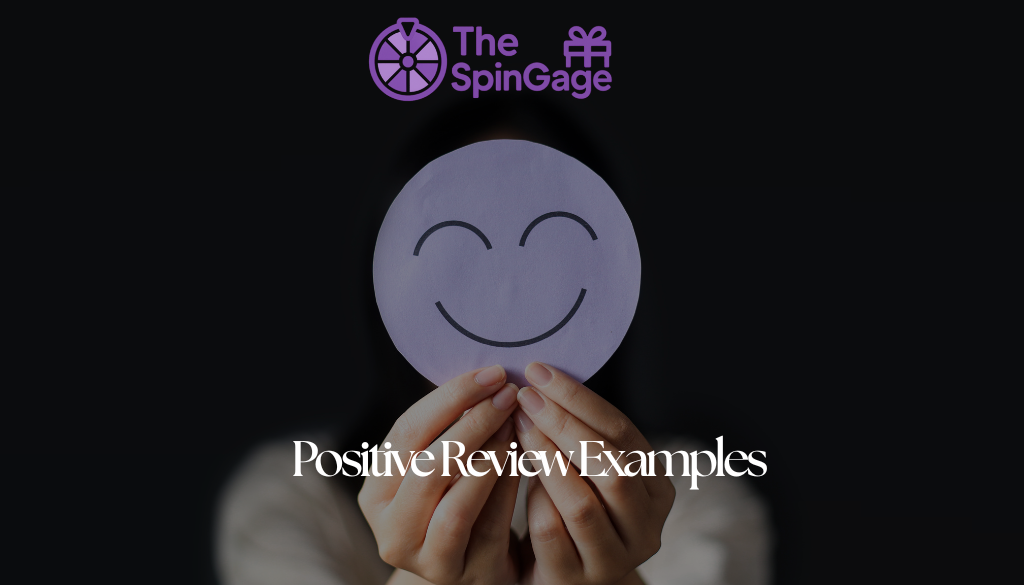

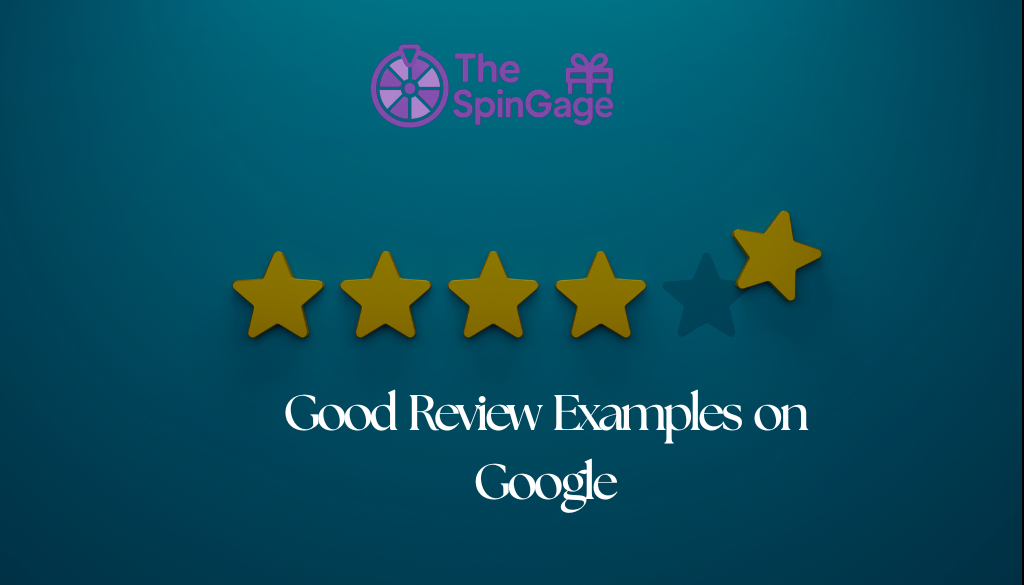

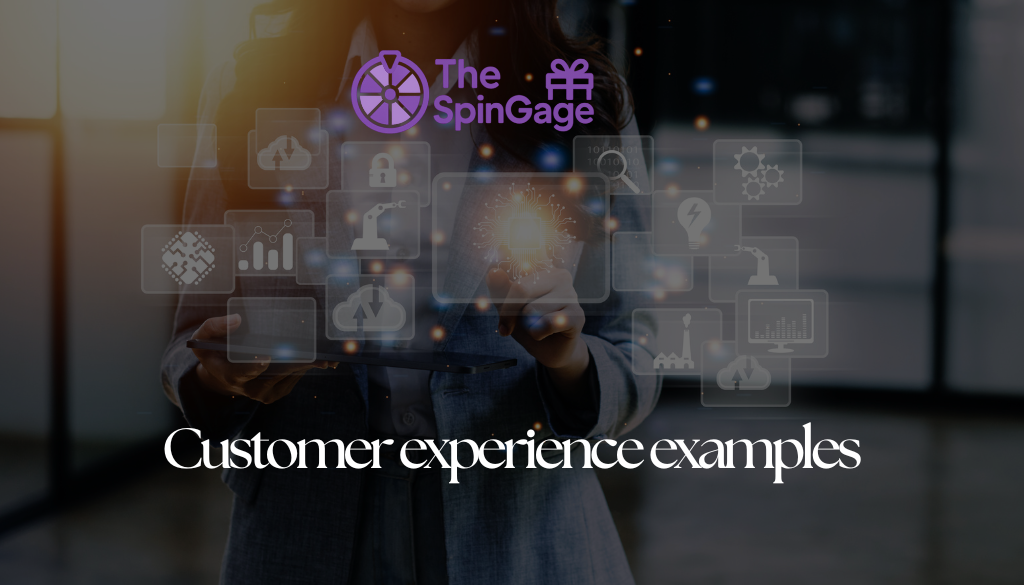

Leave a Reply